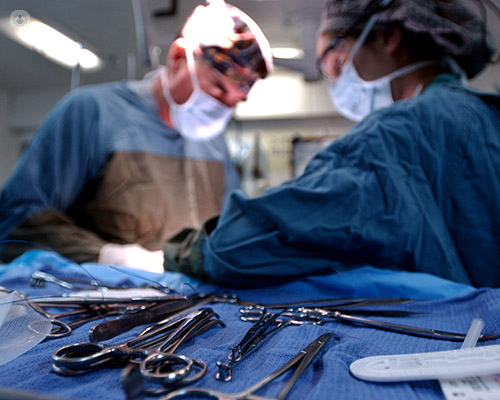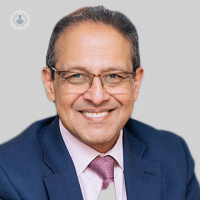Surgical options for stomach and oesophageal cancer
Escrito por:Stomach cancer and oesophageal cancer are quite uncommon forms of cancer. According to Cancer Research UK, stomach cancer is the 17th most common form of cancer in the UK. Around 2% of new cases of cancer that are diagnosed, are stomach cancer, which is around 19 people per day diagnosed. Oesophageal cancer is a little more common, being the 13th most common form of cancer in the UK, with 25 new cases diagnosed each day. Once you are diagnosed with stomach or oesophageal cancer, treatment usually involves a course of chemotherapy or radiotherapy, and surgery to remove all or part of the stomach or oesophagus may be required. The outcome of treatment depends on the stage of the disease at diagnosis, and management by a multidisciplinary team with expertise in oesophagogastric cancer. Here consultant surgeon, Professor Muntzer Mughal explains the surgery in more detail.

Surgery for stomach cancer
If stomach cancer has been diagnosed, it may be necessary to remove part or all of the stomach. This procedure is called a gastrectomy, and the surgeon will leave as much healthy stomach tissue as possible, ensuring that the cancer and associated lymph nodes are removed.
Partial gastrectomy
If the cancer is diagnosed relatively early, and affects only a small part of the stomach, it may be possible to save some of the stomach, and only the cancerous tissue and nearby fatty tissue and lymph nodes will be removed.
Total gastrectomy
This procedure involves the complete removal of the stomach, associated lymph nodes and possibly sections of nearby organs if the cancer has spread.
The oesophagus will be connected to the small bowel, which becomes the ‘new’ stomach.
After stomach cancer surgery
You will still be able to eat normally following surgery, even in cases of a full gastrectomy, though you may need to eat smaller portions, as you may feel full more quickly.. You may need to have chemotherapy after surgery to reduce the chances of the cancer returning.
Surgery for oesophageal cancer
In much the same way as with stomach cancer, oesophageal cancer involves removal of the cancerous section of oesophagus and the surrounding tissue and lymph nodes. In most cases, a portion of the upper part of the stomach will be removed with the tumour. The surgery can be a complicated procedure, with access needed to upper abdomen, and to the chest through the ribs, usually on the right side.
Oesophagectomy
Once the cancerous tissue is removed, the healthy oesophagus tissue will be connected to the remaining stomach which is shaped into a tube.
Endoscopic resection
New surgical techniques for treating oesophageal cancer include endoscopic resection. In this procedure, the cancerous tumour is removed through an endoscope if it is in the early stages. This procedure is less invasive, meaning recovery times are much faster.
After oesophageal surgery
There are a number of risks associated with oesophageal surgery, as with stomach surgery. Risks of infection, bleeding, blood clots, and leakage from connections can occur. However, the risk of these complications is very low when the operation is carried out by specialist surgeons working in a dedicated multidisciplinary team. Professor Mughal is supported by such a team at the London Clinic, which also has excellent infrastructure such as the intensive care unit, dedicated ward and a team of specialist nurses, physiotherapists, dieticians and pain specialists.
You should be able to eat normally once you have recovered from surgery, though because the meal sizes may need to be reduced, then you may need to eat more frequently.
To make an appointment with a stomach and oesophageal cancer surgery specialist, click here.



